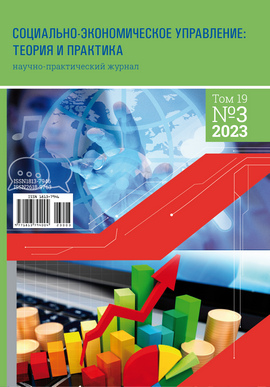ПРИРОДА СЕНСИТИВНОСТИ И ЕЕ РОЛЬ В ОБРАЗОВАТЕЛЬНОМ ПРОЦЕССЕ
DOI:
https://doi.org/10.22213/2618-9763-2023-3-83-91Ключевые слова:
способность к обучению, обучаемость, характеристики сенситивности, сенситивная сеть, сенсорная сенситивность, ментальная сенситивностьАннотация
Статья посвящена исследованию природы ментальной сенситивности, под которой понимается характерологическая особенность человека, присущая ему и обусловленная работой его психики. В этом отношении ментальная сенситивность противопоставляется сенсорной сенситивности, т. е. психологический аспект личности входит в столкновение с физиологическим. Однако такое понимание проблемы является неверным. Ментальную и сенсорную сенситивность необходимо, если мы говорим о формировании и развитии личности, рассматривать во взаимосвязи. Единственный критерий, который может различать ментальную и сенсорную виды сенситивности, это критерий измеряемости. Особое внимание в статье уделено роли, которую сенситивность способна играть в образовательных возможностях личности. Рассмотрены такие критерии, как креативность, т. е. способность к творчеству, и обучаемость, т. е. способность к обучению. Выделены следующие характеристики сенситивности: градация, измеряемость и неизмеряемость, врожденность и генетическая обусловленность, непосредственность, развиваемость, зависимость от социума, этапность, спонтанность и регулярность, положительное и отрицательное влияние. В заключение исследования был сделан вывод, что как высокая, так и низкая сенситивность может влиять на образовательный процесс и положительно, и отрицательно. Все зависит от того, в какой степени человек способен осознавать свою сенситивную зависимость и управлять ею. Был сделан вывод, что все виды сенситивности объединяются в сеть, способную подвергаться корректировке: если меняется один из ее параметров, это может привести и к сетевым изменениям. Кроме того, наблюдается прямая связь между уровнем сенситивности и креативными способностями личности: чем выше ментальная и сенсорная чувствительность, тем в большей степени у него проявлено творческие способности.Библиографические ссылки
Korchak Yа. Kak lyubit' rebenka [How to love a child]. Moscow, AST Publ., 2019, 576 p.
Martindale C., Anderson K., Moore K., West A. N. Creativity, oversensitivity, and rate of habituation. Personality and Individual Differences, 1996, vol. 20, issue 4, рр. 423-427.
Kalashnikova M.B. [Development of L.S. Vygotsky's ideas on the sensitive periods of ontogenesis in modern domestic and foreign psychology]. Kul'turno-istoricheskaya psihologiya, 2007, vol. 3, no. 3, рр. 33-41. (in Russ.).
Anan'ev B.G. Izbrannye psihologicheskie trudy. V 2 t. T. I. [Selected psychological works. In 2 vols. Vol. I]. Moscow, Pedagogy Publ., 1980, 230 p. (in Russ.).
Vygotskij L.S. Psihologiya razvitiya cheloveka [Psychology of human development]. Moscow: Eksmo Publ., 2005, 1136 p. (in Russ.).
Vygotskij L.S. Myshlenie i rech' [Thinking and speech]. Moscow, Labyrinth Publ., 1999. 352 p. (in Russ.).
Erikson E.H. Growth and Crises of the "Healthy Personality". Symposium on the Healthy Personality. M J.E. Senn, editor. New York, Josiah Macy, Jr. Foundation, 1950, pp. 91-146.
Erikson E.H. Childhood and Society. New York, W.W. Norton & Company, 1963, 448 p.
Shtyk K.S. [Irreversibility of the sensational period: mowgli children]. Mirovaya nauka, 2019, no. 5 (26), рр. 745-747. (in Russ.).
Kosheleva E.S. [Aesthetic sensitivity is the dominant in modeling the process of development of creative abilities in children 2-5 years old]. Vestnik Baltijskogo federal'nogo universiteta im. I. Kanta, 2015, no. 5, рр. 134-141. (in Russ.).
Blueprint. Reviewed by Jeffrey M. Craig. Australia Twin Research and Human Genetics, 2019, no. 22, pp. 75-77.
Plomin R. Blueprint: How DNA Makes Us Who We Are. Allen Lane, 2018, р. 288.
Sabadosh P.A. Razrabotka metodov diagnostiki jesteticheskih sposobnostej: testy jesteticheskoj chuvstvitel'nosti [Development of methods for diagnosing aesthetic abilities: tests of aesthetic sensitivity]. Sovremennye issledovaniya intellekta i tvorchestva]. Moscow, Institute of Psychology of the Russian Academy of Sciences, 2015, pp. 250-262. (in Russ.).
Myagkov A.Yu. [Statistical strategies of sensational measurements]. Sociologicheskie issledovaniya, 2002, no. 1, рр. 111-121. (in Russ.).
Nekipelova I. M., Nekipelov E. Sh. [Human capital of personality: vital, hard, soft, mental and meta skills]. Social'no-jekonomicheskoe upravlenie: teorija I praktika, 2021, 18, no.1, pp. 60-75. (in Russ.). EDN: RGMUPI. DOI: 10.24412/2470-1262-2022-1-41-51
Kodzhaspirova G.M., Kodzhaspirov A.YU. Pedagogicheskij slovar' [Pedagogical dictionary]. Moscow, Academy Publ., 2003, 176 р. (in Russ.).
Burmistrova M.N., Vasil'eva L.L., Kashcheeva A.V., Kirilenko N.P., PetrovaL.Yu., Chernyaeva T.N. Social'no-pedagogicheski jslovar' [Social and pedagogical dictionary]. Saratov, Saratov State University, 2016, 126 p. (in Russ.).
Pushkareva T.V. [The problem of interiorization of knowledge in psychological and pedagogical science]. Sovremennye problem nauki i obrazovaniya, 2015, no. 1-1, рр. 35-45. (in Russ.).
Nekipelova I.M. Processy jazykovoj interiorizacii i jeksteriorizacii v osushhestvlenii mezhkul'turnoj kommunikacii v prostranstve polikul'turnogo sociuma [Processes of language interiorization and exteriorization in the implementation of intercultural communication in the space of a multicultural society]. Sovremennye trendy v mezhkul'turnoj kommunikacii i didaktike: monografija, Warsaw, Varshavskij gosudarstvennyj universitet, 2022, рр. 396-421. (in Russ.).
Nekipelova I. M., Minasyan S.M. [Problems of atypical interiorization of multi-valued omonyms of the non-native language (based on the relation of the word "предложение" to its corresponding words in English and Yoruba)]. Cuadernos de Rusística Española, 2021, no. 17, pp. 117-133. (in Russ.). EDN: JOXNHB, DOI: 10.30827/cre.v17.21054
Загрузки
Опубликован
Как цитировать
Выпуск
Раздел
Лицензия
Copyright (c) 2023 И М Некипелова, Э Ш Некипелов

Это произведение доступно по лицензии Creative Commons «Attribution» («Атрибуция») 4.0 Всемирная.


